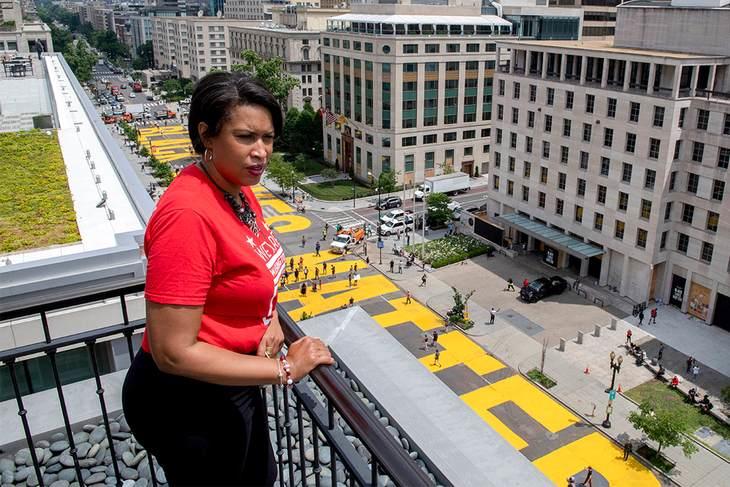Authored by Tyler O’Neil via PJMedia.com,
Last week, the District Court for the District of Columbia ruled that Capitol Hill Baptist Church (CHBC) can resume outdoor services despite Washington, D.C., Mayor Muriel Bowser’s coronavirus restrictions.
In his ruling, Judge Trevor McFadden implicitly rebuked Bowser for encouraging one type of gathering — Black Lives Matter protests — while cracking down on religious gatherings.
“No matter how the protests were organized and planned, the District’s (and in particular, Mayor Bowser’s) support for at least some mass gatherings undermines its contention that it has a compelling interest in capping the number of attendees at the Church’s outdoor services,” McFadden wrote.
Bowser’s COVID-19 restrictions prohibit church services with more than 100 people (originally they only allowed services with 10 people or fewer).CHBC, an 853-member church in D.C., requested permission to meet at the 45,000-plus-seat Robert F. Kennedy Stadium, which would give them ample room to social distance, but the city refused the church’s request. On September 22, CHBC filed a lawsuit and requested a temporary restraining order preventing Bowser from penalizing them for gathering.
CHBC cited the First Amendment and the Religious Freedom Restoration Act, which requires the government to meet strict scrutiny when abridging religious liberty. This means the government must prove that it has a compelling state interest and that its restrictions are the “least restrictive means” of meeting that interest.
The judge ruled that CHBC is likely to prevail in its lawsuit since Bowser’s double standard on the protests undercuts her claim to have a compelling state interest to prevent gatherings to slow the spread of the coronavirus pandemic.
“Consider the District’s response to mass protests over the past year, which included thousands of citizens marching through the streets of the city, including along streets that the District closed specifically for that purpose,” McFadden noted.
“And the Mayor appeared at one of the mass gatherings, ‘welcom[ing]’ hundreds if not thousands of protestors tightly packed into Black Lives Matter Plaza and announcing that it was ‘so wonderful to see everybody peacefully protesting, wearing [their] mask[s].’”
The judge also noted that Bowser “christened ‘Black Lives Matter Plaza’ when ‘she directed the D.C. Department of Public Works to create a mural on 16th Street N.W., near the White House, to ‘honor the peaceful protesters from June 1, 2020 and send a message that District streets are a safe space for peaceful protestors.””
Indeed, Bowser directed staff to paint “Black Lives Matter” on the road across from the White House in an act of state-sanctioned graffiti.
“The Mayor’s apparent encouragement of these protests also implies that the District favors some gatherings (protests) over others (religious services),” McFadden argued.
“When faced with similar facts in a First Amendment challenge, another court explained that high-profile government officials encouraging and participating in protests ‘sent a clear message that mass protests are deserving of preferential treatment,’” the judge added, citing Soos v. Cuomo (2020).
In that case, the court noted that Governor Andrew Cuomo (D-N.Y.) and New York City Mayor Bill de Blasio “could have ‘been silent’ or ‘could have just as easily discouraged protests, short of condemning their message, in the name of public health,’” but they did not take either of these courses.
“The District attempts to distinguish the risks posed by mass ‘protest marches’ from those posed by ‘worship services in which individuals stand in place for long periods of time,’ … but it marshaled no scientific evidence on this point,” McFadden argued. “In fact, the District’s brief explains that the protests did not trigger any spike in COVID-19 ‘outbreaks,’ undermining the notion that large gatherings are always exceptionally dangerous.”
“With this ruling, our government is restoring equity by extending to religious gatherings the same protections that have been afforded other similar gatherings during this pandemic,” Justin Sok, a pastor at CHBC, said in a statement. “We trust that this will be a blessing not only to our congregation but to the rest of our neighbors in D.C.”
“A church is not a building that can be opened or closed. A church is not an event to be watched. A church is a community that gathers regularly and we are thankful that such communities are once again being treated fairly by our government,” he added.
Earlier this month, the Department of Justice filed a statement of interest supporting CHBC.
“Although the precise legal tests may change based on the specific restriction at issue, the bottom line remains the same: there is no pandemic exception to the Constitution and our fundamental rights,” the DOJ lawyers declared [Emphasis added].
“Individual rights set forth in the Constitution are always operative and restrain government action.”
